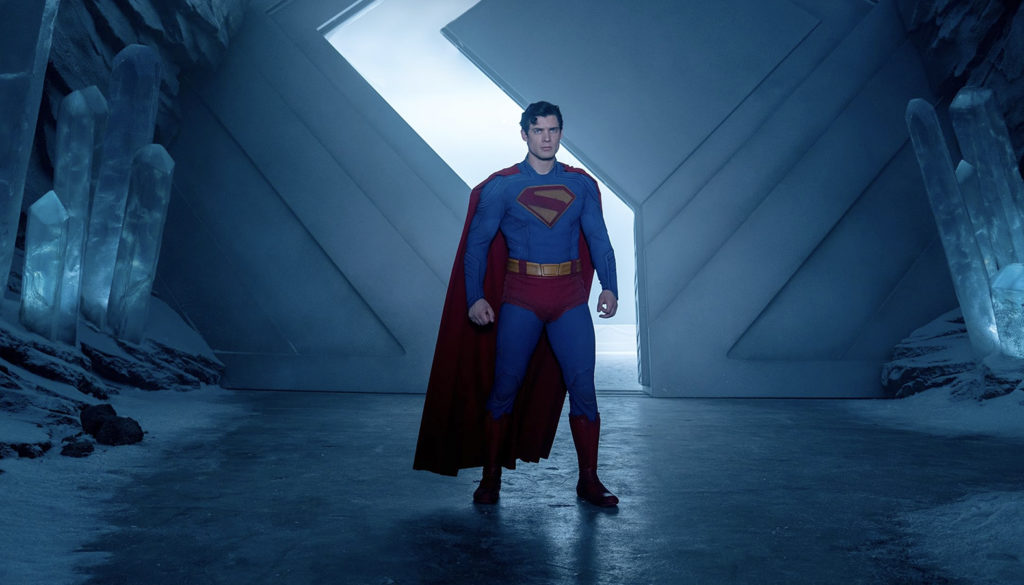It’s a bird! It’s a plane! It’s a reasonably diverting time at the pictures!
Superman is a remarkably simple character, which is why he proves almost impossible to get right. The latest installment from writer-director James Gunn, in theaters now and for the foreseeable future, proves far from perfect but reorients the character back to his aw-shucks decency, a welcome corrective to the previous decade of Kryptonian grimness.
This installment starts in medias res, eliding the Superman origin story under the correct assumption that most of us know the basic beats. For those unfamiliar or recently released from 100 years of solitary confinement, Superman is an alien refugee from the planet Krypton, rocketed out as a baby seconds before its destruction.
His ship is found by a childless Kansas couple, raised with good Midwestern corn-fed values to become Earth’s mightiest hero. His story is a sort of inverse Moses, the Egyptians sending their child downriver to live among the humble Israelites.
This Clark Kent (David Corenswet) is still fresh in his superheroing career, making the well-intentioned but politically fraught decision to intervene in the Boravia-Jarhanpur war. You sense that Gunn was intending to comment on the Ukraine war, but an accident of history draws far more parallels to the recent war in Gaza: D.C. (the city, not his comic book) isn’t happy, and while Superman may fight for truth, justice, and the American Way, those only occasionally coincide with the goals of the U.S. government.
Superman’s archenemesis Lex Luthor (Nicolas Hoult) intends to exploit this friction. This version of Lex is in the thick of his 30s, which puts his baldness in the precise awkward gap between baby and male-pattern where there is no logical explanation.
As the CEO behind the powerful LexCorp, Luthor is recognized as the smartest man in the world but that simply isn’t enough. Superman literally floated down and gets all the praise for his God-given gifts, whereas Lex had to scrap and earn every bill of his billions of dollars. He will do anything to make Earth recognize him as its true hero, even destroy it.
Superman is aided as always by Lois Lane (Rachel Brosnahan), who in this version knows Clark is Superman and is irritated with both personas. There’s a great scene where she interviews Superman on the record, managing to interrogate him on two separate levels for his geopolitical and romantic clumsiness.
Gunn solves 90% of the problems of prior adaptations by recognizing that a proper Lois is as vital to the alchemy as Superman. Previous renditions were too soft, she needs to be Rosalind Russell, all smacking gum and weaving verbal circles around the hayseed. She is the surrogate for a more cynical audience, aghast at how anyone can be so naive while loving him precisely for it.
This is the most successful Superman film since Christopher Reeves because those movies also understood that one underlying truth: that despite the triangle on his chest, Superman is a square. More than his laser eyes or leaping abilities, what’s most unbelievable about this Superman is how he remains an unabashed boy scout in a time of moral ambiguity.
There was once studio speculation on whether James Bond could still work with modern audiences (ridiculous in retrospect, because drunk philanderers are timelessly popular and recession-proof). But it remains a real question if Superman could translate for the opposite reason, if there was room for a Goody Two-Shoes in a scuffed world.
This century we seem far more comfortable with Batman and his trauma-forged crusade than Superman and his unconflicted goodness. There was even a moment where we had two different Batmen in theaters at the same time (played by Ben Affleck and Robert Pattinson) and no Superman — how’s that for an epitaph to the 2010s?
The previous Zack Snyder Superman films decided to adapt him to the times, the Man of Tomorrow becoming a man of today, and went for a more greyscale palette, both visually and morally (Christopher Nolan was even a producer on it, just to underline our attempts to turn Superman into Batman).
While perhaps more in line with our newfound emo ethos, it just didn’t feel like Superman. We come to him for optimism, for primary colors. Comic book writer Frank Miller once described Metropolis as Manhattan in the daytime and Gotham as Manhattan at night. In our quest for complexity, all we managed to do was flip off the sun.
The Snyder films also emphasized the (for lack of a better word) divinity of Superman. They weren’t the first to draw parallels between Clark Kent and Christ — rare is the “Superman” director who resists a shot with his arms spread out in crucified homage. In the parlance of Ben Shapiro, Superman truly is Judeo-Christian as he manages to be both Moses and Jesus simultaneously.
At my Jesuit university we were taught the concept of a High Christology and a Low Christology, with the former focusing on Christ’s divinity and the latter on his humanity. The Snyderverse was of the first camp, with classical iconography and a fixation on the burden of Superman’s responsibility to his people.
This latest installment instead emphasizes that he is of the people, as well as by them and for them. For Gunn, heroism comes from the micro, not the macro. It’s easy to dedicate yourself to the human race as an abstract, but we trust this Superman because he will suffer for his dog.
In a sense this is a false dichotomy. Christ is both God and Man, Superman is both Kal-El and Clark. The only distinction between them lies in a pair of false prescription glasses. But it is still nice to remember that in his title also lies a promise: that no matter how high he flies or as super as he gets, Clark Kent is still fallibly, endearingly, a man.

